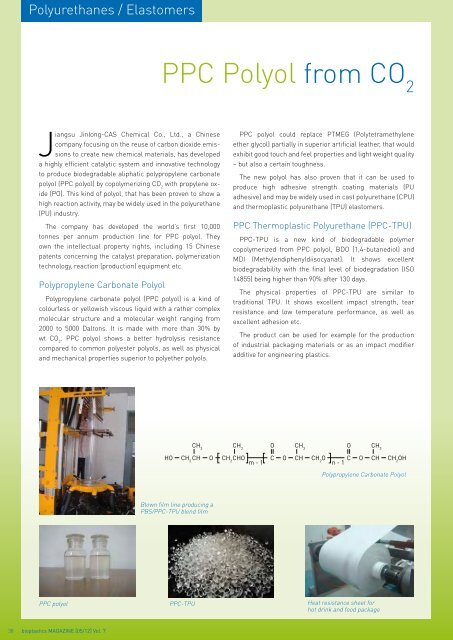bioplasticsMAGAZINE_1205
bioplasticsMAGAZINE_1205
bioplasticsMAGAZINE_1205
Create successful ePaper yourself
Turn your PDF publications into a flip-book with our unique Google optimized e-Paper software.
Polyurethanes / Elastomers<br />
PPC Polyol from CO 2<br />
Jiangsu Jinlong-CAS Chemical Co., Ltd., a Chinese<br />
company focusing on the reuse of carbon dioxide emissions<br />
to create new chemical materials, has developed<br />
a highly efficient catalytic system and innovative technology<br />
to produce biodegradable aliphatic polypropylene carbonate<br />
polyol (PPC polyol) by copolymerizing CO 2<br />
with propylene oxide<br />
(PO). This kind of polyol, that has been proven to show a<br />
high reaction activity, may be widely used in the polyurethane<br />
(PU) industry.<br />
The company has developed the world’s first 10,000<br />
tonnes per annum production line for PPC polyol. They<br />
own the intellectual property rights, including 15 Chinese<br />
patents concerning the catalyst preparation, polymerization<br />
technology, reaction (production) equipment etc.<br />
Polypropylene Carbonate Polyol<br />
Polypropylene carbonate polyol (PPC polyol) is a kind of<br />
colourless or yellowish viscous liquid with a rather complex<br />
molecular structure and a molecular weight ranging from<br />
2000 to 5000 Daltons. It is made with more than 30% by<br />
wt CO 2<br />
. PPC polyol shows a better hydrolysis resistance<br />
compared to common polyester polyols, as well as physical<br />
and mechanical properties superior to polyether polyols.<br />
PPC polyol could replace PTMEG (Polytetramethylene<br />
ether glycol) partially in superior artificial leather, that would<br />
exhibit good touch and feel properties and light weight quality<br />
– but also a certain toughness.<br />
The new polyol has also proven that it can be used to<br />
produce high adhesive strength coating materials (PU<br />
adhesive) and may be widely used in cast polyurethane (CPU)<br />
and thermoplastic polyurethane (TPU) elastomers.<br />
PPC Thermoplastic Polyurethane (PPC-TPU)<br />
PPC-TPU is a new kind of biodegradable polymer<br />
copolymerized from PPC polyol, BDO (1,4-butanediol) and<br />
MDI (Methylendiphenyldiisocyanat). It shows excellent<br />
biodegradability with the final level of biodegradation (ISO<br />
14855) being higher than 90% after 130 days.<br />
The physical properties of PPC-TPU are similar to<br />
traditional TPU. It shows excellent impact strength, tear<br />
resistance and low temperature performance, as well as<br />
excellent adhesion etc.<br />
The product can be used for example for the production<br />
of industrial packaging materials or as an impact modifier<br />
additive for engineering plastics.<br />
CH 3<br />
CH 3<br />
O CH 3<br />
O CH 3<br />
[ [<br />
[<br />
HO CH 2<br />
CH O CH 2<br />
CHO C O CH CH 2<br />
O C O CH CH 2<br />
OH<br />
m - 1 n - 1<br />
[<br />
Polypropylene Carbonate Polyol<br />
Blown film line producing a<br />
PBS/PPC-TPU blend film<br />
PPC polyol<br />
PPC-TPU<br />
Heat resistance sheet for<br />
hot drink and food package<br />
38 bioplastics MAGAZINE [05/12] Vol. 7


















